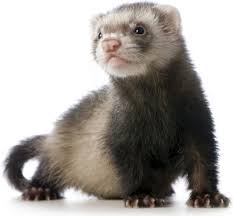Neutering and Heat Control

Male ferrets can be neutered (castrated) from 12 weeks of age. Neutering males reduces their dominant character and reduces their characteristic unpleasant (to most people) odour.
If female ferrets are not going to be bred from they can be neutered from 6-8 months. Neutering female ferrets prevents long oestruses (failure to mate can result in a prolonged oestrus for the duration of the breeding season. The high levels of oestrogens produced may cause bone marrow suppression with leucopenia, thrombocytopaenia and aplastic anaemia).
If you want your ferret neutering simply ring the surgery to book an appointment. However recent research has shown that surgical neutering of ferrets can cause hormonal problems in some individuals. See below. The basis for the following information came from the Royal Veterinary College.
Neutering ferrets (either spaying or castrating) can make them more likely to develop a disease called ‘Hyperadrenocorticism’ or Cushing’s disease. The adrenal glands begin to overproduce hormones that lead to hair loss, weight loss, vulval swelling (jills) itchy skin and hyper-sexuality (even in neutered animals). Hyperadrenocorticism is not curable but is a treatable condition in ferrets. Their is an alternative to neutering using hormonal implants.
- These hormones are in a slow release form injected under the skin under sedation or anaesthesia.
- They can be used in both males and females but are only licensed for use in male ferrets.
- They stop the female ferret cycling and the male from being able to impregnate a female.
- They also reduce odour between 5 weeks and 14 weeks after implantation.
- Treated male ferrets should still be kept away from jills on heat within the first few weeks after initial treatment. In males, levels of testosterone remain low for up to 16 months. Any mating that occurs more than 16 months after the administration of the product may result in pregnancy.
- The need for subsequent implantations should be based on the increase in testis size and return to sexual activity.
- It is not known if males injected with such implants would be able to be used for breeding at a later date so their use should be considered in such circumstances.
- The implants in females can be injected at the start of spring and should last approximately 18 months (through 2 breeding seasons). A short false season may occur shortly after implantation.
- Hormonal implants should be considered a safe, effective alternative to neutering in male and female ferrets.
- These hormonal implants can be used to treat a ferret with hyperadrenocorticism. The benefit of treatment can last 2-4 years.
- Can be used for the prevention/suppression of oestrus in female ferrets. But oestrogen production will continue for 2 weeks which must be taken into account if the Jill has already been in heat for more than 2 weeks.
- Please click the following link for more information about the hormonal implant. Virbac.

